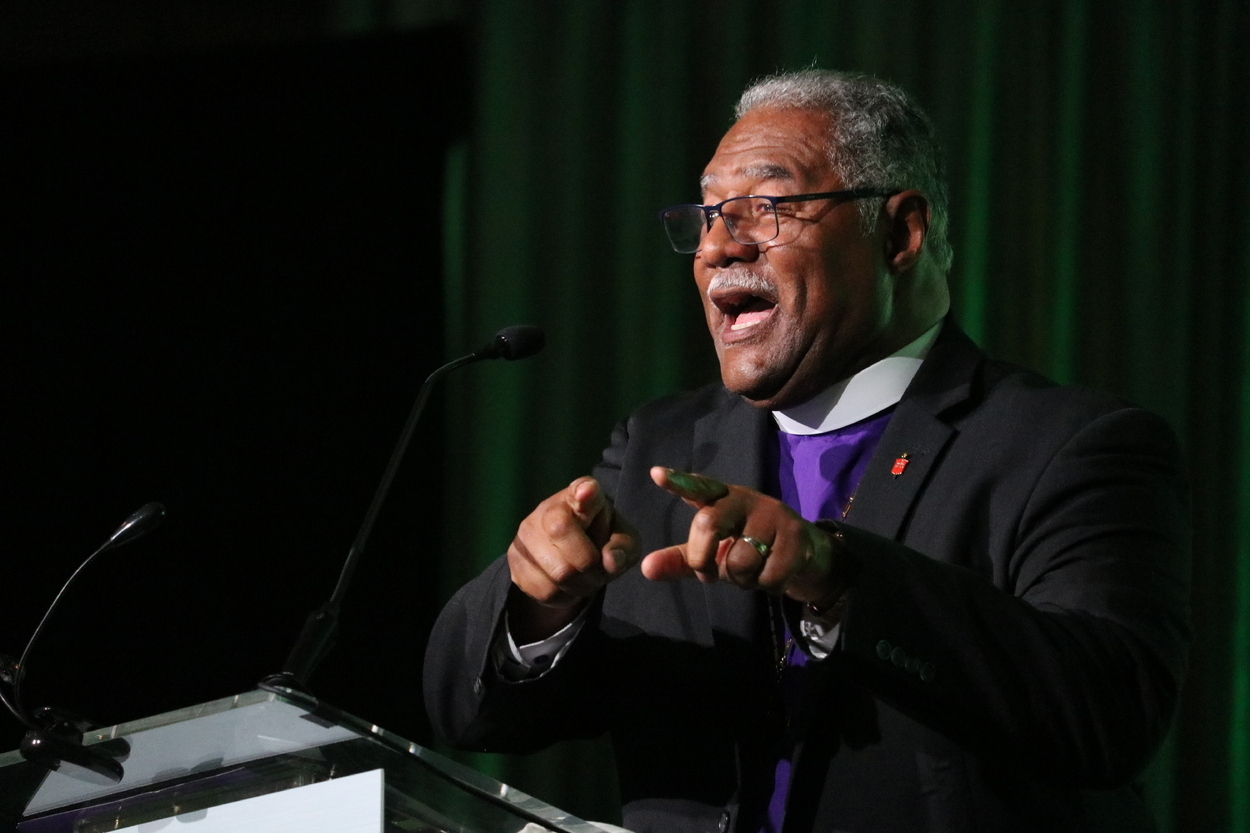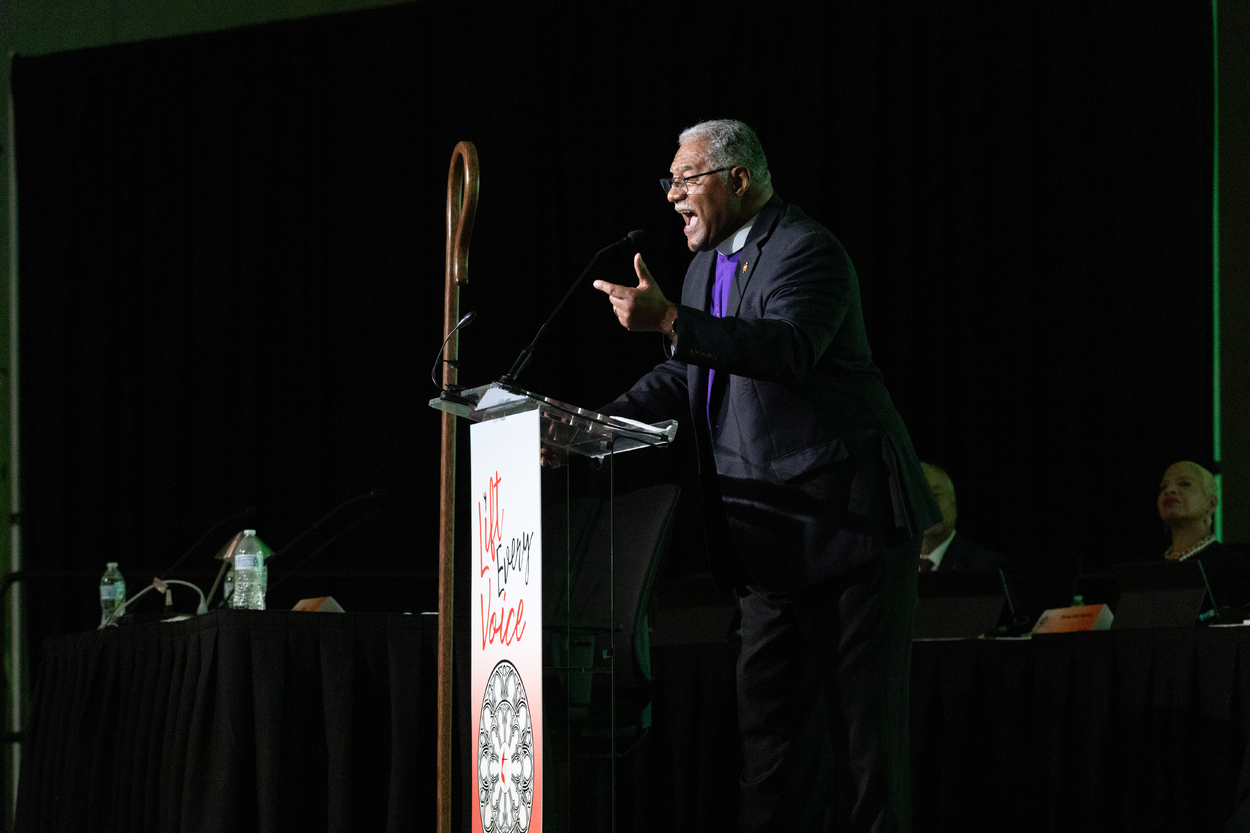
Doing good and doing justice

Bishop Julius C. Trimble preaching an inspiring message at morning worship. Photos by NCJ communicators.
“There is great power in the name of Jesus Christ” was Bishop Julius C. Trimble’s commanding refrain in the sermon he gave during Thursday morning worship. This power is available to us today, and he encouraged those gathered to hold fast to this promise by doing good and by doing justice.
The resident bishop of the Indiana Conference took Acts 3:1-9 — Peter’s healing of a lame man sitting by the temple gate and asking for alms — as the scriptural foundation for his message. It centered on “doing good,” the second of Wesley’s three simple rules for holy living, and the theme for the second day of the 2024 North Central Jurisdictional Conference.
Watch Bishop Trimble’s sermon.
Bishop Trimble focused on living into the transformative power found in Jesus Christ, which changes lives and dismantles societal structures that bind people and keep them from their full humanity. We are not to be “mere historical spectators of the mighty works of the Holy Spirit through the apostles and the early believers” in the book of Acts, he said. Like Peter, we’ve received the “baton of greater works, including those of healing, restoration, reconciliation, and liberation.”
The bishop segued into a story of going to a Bloomington, Indiana park for a walk for peace that called for a ceasefire in Gaza. During the walk, attendees encountered a section where dozens of unhoused individuals lived. The bishop couldn’t unsee what he witnessed. Even though the purpose of the walk was to address a humanitarian crisis thousands of miles away, he was reminded of the justice issues in our own communities.
“Since we last gathered as an NCJ Conference,” explained Bishop Trimble, “there has been an increase in the number of unhoused people in this country. Just a few days ago, the Supreme Court has made homelessness a crime, such that the dozens of men and women we saw in that park are subject to forced removal and arrest.”
John Wesley’s simple rule of “doing good” is part of our call to a sanctified life, but Bishop Trimble said we must be doing these good works in tandem with doing justice. It’s going beyond simple acts of kindness to actively work to change public policy for the well-being of all.

Bishop Trimble reminds people "It's about Jesus". Photo by NCJ communicators.
He illustrated this shift in focus with three examples:
- Bringing blankets, soup, and sandwiches is doing good. Advocating for affordable housing, public policy, and support for housing as a basic human right is doing justice.
- Sharing food with the hungry and opening our churches for meals and clothing is doing good. Advocating for a living wage and adequate nutritious food for thousands of children this summer is doing justice.
- Visiting the sick and imprisoned is doing good. Removing barriers to restorative justice is doing justice.
We are to be instruments of healing and liberation like Dietrich Bonhoeffer, who denounced the rise of authoritarianism in Nazi Germany and paid the price of truth-telling, at the risk of his freedom, the bishop said. And, as history tells us, Bonhoeffer was arrested and executed.
United Methodists can stand firmly in their commitment to doing justice by studying and living out the Social Principles, revised and approved by the 2024 General Conference. Bishop Trimble quoted one sentence from the principles to prove his point: “As United Methodists, we acknowledge that love requires responsible political action and engagement aimed at the betterment of society and the promotion of the common good.”
“The Church is the Church only when it exists for others,” argued the bishop. Returning to the story in the book of Acts, he pointed to three things we can learn from the encounter Peter and John had with the man born lame that will move us forward as the Church:
- It takes courage to face the reality and the request. Sometimes we’re answering questions that our communities are not asking.
- Peter and John offered what they had, not what was requested. The apostles had no silver or gold but offered healing through Jesus’ name.
- Peter and John gained credibility not from proclamation alone but from proclamation plus demonstration.
The bishop concluded his message by challenging those listening to trust in the power found in the name of Jesus Christ when tackling life’s biggest challenges and our neighbors’ most painful woes. It still works, he said, for he has seen people in Indiana who had a vision for ministry and did amazing things even with diminished resources.
“We need to stop telling God how big our problems are and start telling our problems how big our God is,” he said.